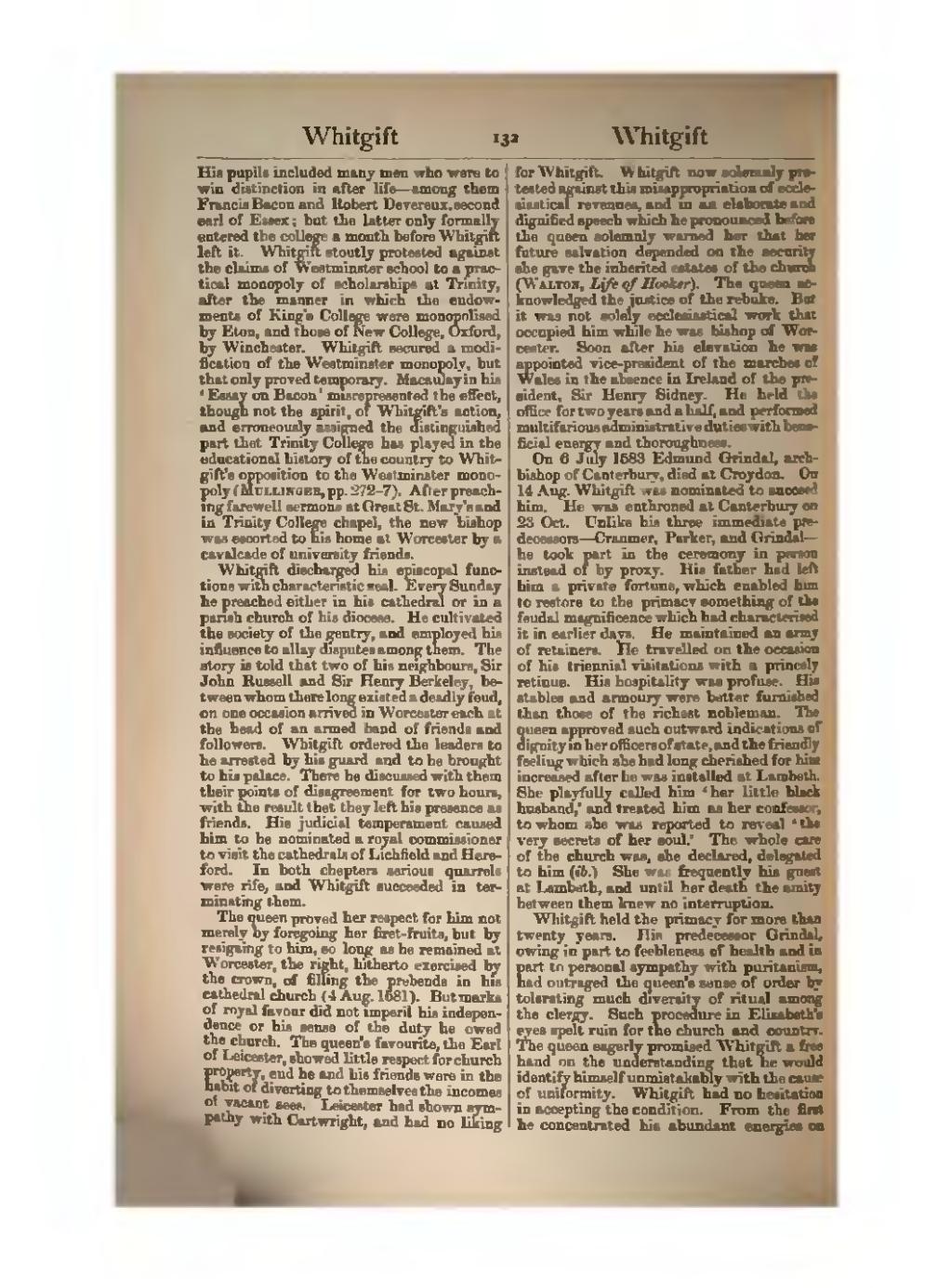His pupils included many men who were to win distinction in after life—among them Francis Bacon and Robert Devereux, second earl of Essex; but the latter only formally entered the college a month before Whitgift left it. Whitgift stoutly protested against the claims of Westminster school to a practical monopoly of scholarships at Trinity, after the manner in which the endowments of King's College were monopolised by Eton, and those of New College, Oxford, by Winchester. Whitgift secured a modification of the Westminster monopoly, but that only proved temporary. Macaulay in his ‘Essay on Bacon’ misrepresented the effect, though not the spirit, of Whitgift's action, and erroneously assigned the distinguished part that Trinity College has played in the educational history of the country to Whitgift's opposition to the Westminster monopoly (Mullinger, pp. 272–7). After preaching farewell sermons at Great St. Mary's and in Trinity College chapel, the new bishop was escorted to his home at Worcester by a cavalcade of university friends.
Whitgift discharged his episcopal functions with characteristic zeal. Every Sunday he preached either in his cathedral or in a parish church of his diocese. He cultivated the society of the gentry, and employed his influence to allay disputes among them. The story is told that two of his neighbours, Sir John Russell and Sir Henry Berkeley, between whom there long existed a deadly feud, on one occasion arrived in Worcester each at the head of an armed band of friends and followers. Whitgift ordered the leaders to be arrested by his guard and to be brought to his palace. There he discussed with them their points of disagreement for two hours, with the result that they left his presence as friends. His judicial temperament caused him to be nominated a royal commissioner to visit the cathedrals of Lichfield and Hereford. In both chapters serious quarrels were rife, and Whitgift succeeded in terminating them.
The queen proved her respect for him not merely by foregoing her first-fruits, but by resigning to him, so long as he remained at Worcester, the right, hitherto exercised by the crown, of filling the prebends in his cathedral church (4 Aug. 1581). But marks of royal favour did not imperil his independence or his sense of the duty he owed the church. The queen's favourite, the Earl of Leicester, showed little respect for church property, and he and his friends were in the habit of diverting to themselves the incomes of vacant sees. Leicester had shown sympathy with Cartwright, and had no liking for Whitgift. Whitgift now solemnly protested against this misappropriation of ecclesiastical revenues, and in an elaborate and dignified speech which he pronounced before the queen solemnly warned her that her future salvation depended on the security she gave the inherited estates of the church (WALTON, Life of Hooker). The queen acknowledged the justice of the rebuke. But it was not solely ecclesiastical work that occupied him while he was bishop of Worcester. Soon after his elevation he was appointed vice-president of the marches of Wales in the absence in Ireland of the president, Sir Henry Sidney. He held the office for two years and a half, and performed multifarious administrative duties with beneficial energy and thoroughness.
On 6 July 1583 Edmund Grindal, archbishop of Canterbury, died at Croydon. On 14 Aug. Whitgift was nominated to succeed him. He was enthroned at Canterbury on 23 Oct. Unlike his three immediate predecessors—Cranmer, Parker, and Grindal—he took part in the ceremony in person instead of by proxy. His father had left him a private fortune, which enabled him to restore to the primacy something of the feudal magnificence which had characterised it in earlier days. He maintained an army of retainers. He travelled on the occasion of his triennial visitations with a princely retinue. His hospitality was profuse. His stables and armoury were better furnished than those of the richest nobleman. The queen approved such outward indications of dignity in her officers of state, and the friendly feeling which she had long cherished for him increased after he was installed at Lambeth. She playfully called him ‘her little black husband,’ and treated him as her confessor, to whom she was reported to reveal ‘the very secrets of her soul.’ The whole care of the church was, she declared, delegated to him (ib.) She was frequently his guest at Lambeth, and until her death the amity between them knew no interruption.
Whitgift held the primacy for more than twenty years. His predecessor Grindal, owing in part to feebleness of health and in part to personal sympathy with puritanism, had outraged the queen's sense of order by tolerating much diversity of ritual among the clergy. Such procedure in Elizabeth's eyes spelt ruin for the church and country. The queen eagerly promised Whitgift a free hand on the understanding that he would identify himself unmistakably with the cause of uniformity. Whitgift had no hesitation in accepting the condition. From the first he concentrated his abundant energies on
